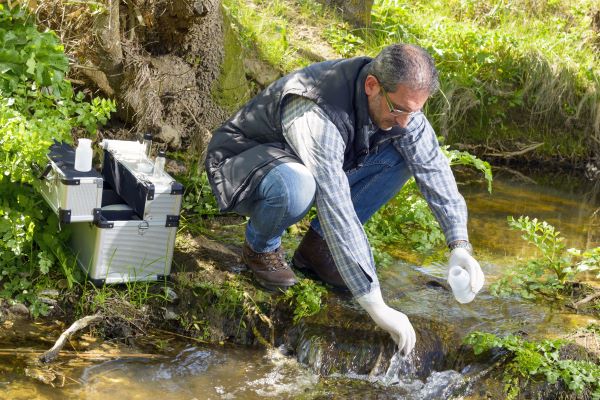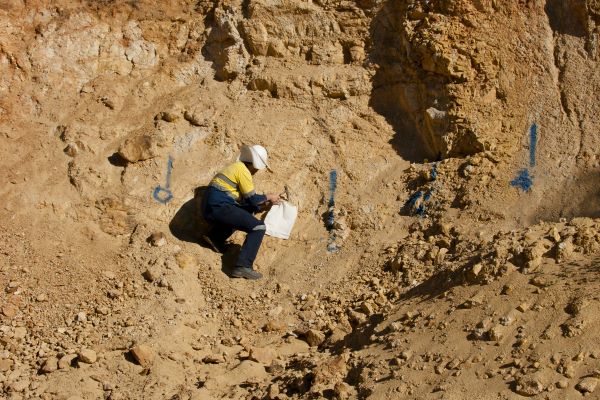Are you naturally curious about the world around you? Do you have the drive to find out why things are a certain way and maybe develop and test new theories and technologies of your own? If so, a career in natural science or physical science could be the perfect path for you.
While there are dozens of possible careers in the life and physical sciences, some of the best careers in science stand out as being especially financially rewarding. Cool science jobs that pay well often emphasize either fundamental research or practical applications of research in a variety of areas.
Who says you can’t earn a lucrative salary while pursuing answers to the universe’s mysteries? With post secondary education (associate’s degrees, bachelor’s degrees, master’s degrees, or doctorates) in science majors, students can work toward these job roles.
Check out our list of the top 10 highest paying science careers for inspiration to guide your own science career journey.
1. Physicist
By median salary, the highest-paid scientist is physicist. Physicists investigate the properties of matter, energy and time. Some physicists perform theoretical research to expand our scientific knowledge of how the universe works, while others engage in applied (practical) research where they put theoretical knowledge to work in practical processes or devices to change the technology our society uses.

What Does a Physicist Do?
Physics aims to answer big questions like how the universe came into existence and what natural laws determine how matter and energy interact. Research in physics can be applied to develop new methods of communication, alternate sources of energy and more advanced medical technology.
Physicists calculate and analyze data. They generate theories to explain phenomena and test those theories through experimentation. The work of physical scientists requires an understanding of complicated mathematics for doing calculations and of the scientific method for appropriately planning and conducting experiments to get accurate data. They also use complex equipment, including lasers and particle accelerators.
While research itself may be a physicist’s main job duty, it’s not the scientist’s sole responsibility. Physicists must draft proposals, successfully apply for the grant funding to conduct their experiments and present their findings both in written papers for publication and at lectures and conferences.
Median Salary: $152,430
Education: Ph.D. in Physics
2. Astronomer
Another of the highest-paid science jobs is astronomer. Astronomers study the structures in space, including stars, planets, galaxies and black holes. They research the properties, movements and compositions of these objects and carefully record and analyze data.

What Does an Astronomer Do?
This is another field of science that requires the ability to perform complex mathematical calculations. To accomplish their research, astronomers use telescopes and other ground-based equipment as well as equipment that has already been launched into space, like the Hubble Space Telescope.
Like physicists, astronomers can choose to focus on either basic, theoretical research or on applying fundamental knowledge to real-world situations. Fundamental astronomy research informs what we know about the universe. Research applications of scientific expertise in astronomy put research findings to use in creating new processes and technologies. Astronomers can also focus on different parts of space, including studying how our own solar system works and researching faraway galaxies.
RELATED: What Degree Do You Need to Be an Astrophysicist?
Astronomers, like their colleagues in other disciplines of science, must understand the research process. This responsibility includes knowing how to develop theories, design and perform experiments and gather and analyze data accurately. Part of an astronomer’s job responsibilities are to secure funding and present their research findings.
Median Salary: $128,160
Education: Ph.D. in Astronomy
3. Biochemists and Biophysicists
Does the study of living things intrigue you? Perhaps a future in biochemistry or biophysics is right for you. The biochemist and biophysicist median salary in the $80,000 range lands this occupation a spot among the most lucrative science careers.

What Does a Biochemist or Biophysicist Do?
These scientists study the chemical and physical properties of organisms to learn about important biological processes. They research how cells develop and how living organisms, from the simplest to the most complex, grow.
RELATED: 50 Top Scholarships for Biology Degrees
The science fields of biochemistry and biophysics necessitate laboratory-based research and experiments. Biochemists and biophysicists use a variety of equipment to study living things, from lasers and electron microscopes to computer modeling software. They analyze molecules, isolate DNA and experiment to determine how various medications, nutrients and hormones affect the tissues and processes of an organism.
In addition to designing and implementing experiments, biochemists and biophysicists record their findings in research papers, technical reports and presentations.
As with many other sciences, biochemists and biophysicists conduct basic or applied research.
RELATED: Highest Paying Jobs With a Biology Degree – Degrees in Biology – Majors & Careers
Basic research in biochemistry and biophysics may revolve around learning how genes mutate and how evolution works. Applied research builds upon these theoretical understandings. Examples of research applications in biochemistry and biophysics include the development of the following:
- Diagnostic tests
- Medications
- Treatments for genetic disorders
- Ways of genetically altering plant food and fuel sources to be less vulnerable to the elements
Biochemists and biophysicists help society make important innovations in medicine, agriculture and many other fields.
Median Salary: $102,270
Education: Ph.D. in Biochemistry or Biophysics
4. Materials Scientist
While the job title itself may be new to many aspiring scientists, work in the field of materials science isn’t that unfamiliar. Material science is another example of science degrees that pay well – in this case, with only a bachelor’s degree.

What Does a Researcher in the Field of Materials Science Do?
In some ways, the job of a materials scientist is similar to that of a chemist. Both pursue a common goal: to learn about the molecular and atomic makeups of substances and research how various substances interact.
Unlike chemists, though, scientists specializing in the study and research of materials typically study the structures and properties of a type of material. Examples of the types of materials one might study include:
- Metal alloys
- Glass
- Semiconductors
- Ceramics
These researchers develop specialized knowledge, typically for the purpose of improving the material. Materials scientists have somewhat higher median salaries than chemists, though their job outlook is slightly less positive.
Scientists in this field design and implement research experiments to evaluate the properties and components of a substance. With the use of computer science and laboratory equipment, these scientists analyze data. From their data analysis, they create virtual 3D models and simulations representing the atomic and molecular structure of a substance.
Researchers in this science field devise and test various ways of strengthening materials or new methods of combining substances for practical uses.
Like other science professionals, materials scientists share their findings through written reports, articles and presentations.
Median Salary: $100,090
Education: Bachelor’s Degree in Materials Science, Chemistry, Physics or Engineering
5. Nuclear Technicians
In nuclear power plants, engineering services and research and development laboratories, nuclear technicians play an important and necessary role. In these high-paying science careers, a scientist or researcher would observe the performance of nuclear power equipment to make sure that research and power generation are done safely.

What Does a Nuclear Technician Do?
Depending on their job responsibilities, a technician with a background in nuclear science and engineering may use equipment such as radiation detectors, spectrometers, dosimeters and particle accelerators. They analyze radiation in the air, soil and water to determine levels of radiation and radioactive communication.
When a process or environmental condition exposes personnel to dangerous levels of radiation, nuclear technicians provide safety instructions.
These science technicians find employment in a variety of workplaces. Where they work determines in a large part what their job duties entail.
In the nuclear generation and distribution industry, operating technicians oversee the functioning of nuclear power plant systems. Radiation protection technicians focus more closely on identifying radioactive contamination.
In laboratories, technicians in this specialized field are more likely to assist nuclear engineers and physicists with research. These professionals have a hand in innovating new uses for and sources of nuclear energy, including devising medical uses of nuclear power and designing new types of nuclear reactors.
This high-paying job doesn’t require a doctorate or master’s degree – or even a bachelor’s degree. In fact, you can launch this career with only an associate’s degree.
Median Salary: $99,340
Education: Associate’s Degree in Nuclear Science
6. Medical Scientists
If you’re interested in the field of medicine but you don’t want to be a doctor, medical scientist could be one of the best science careers for you. These researchers develop ways to improve human health and healthcare. Applications of research in this field include searching for a cure for cancer and creating new medications to treat and prevent a wide range of conditions.

What Does a Medical Research Scientist Do?
Medical scientists conduct experiments and clinical trials to test hypotheses and gather data. They oversee research to make sure the process is safe, prevent contamination by potentially dangerous pathogens and gather data that is as accurate as possible.
Appropriately conducting research is an important part of medical science. So is analyzing the data collected to learn more about the causes of medical conditions and the possible ways of treating them.
Scientists in the field of medical research use their discoveries to create new medical instruments and medical diagnostic equipment as well as drugs. In these science careers, it’s essential to write reports and publish research findings in scientific reports and scholarly journal articles. Getting this important information out to the world allows medical providers to use it to improve patients’ health.
A medical research scientist may do more than seek to cure or treat certain diseases. This occupation also works to develop methods of preventing diseases.
Research and development laboratories in the physical sciences, life sciences and engineering sciences employ the most medical scientists. In addition to these research labs, many scientists in this field find work at colleges and universities, hospitals, physician offices and in the pharmaceutical industry.
Scientists in this field typically specialize in a particular type of research. The numerous specialty careers within this scientific field include:
- Toxicologists
- Pharmacologists
- Gerontologists
- Neuroscientists
- Serologists (a type of forensic science technician)
- Cancer researchers
- Immunochemists
- Clinical and medical informaticians
- Research histologists
Median Salary: $95,310
Education: Ph.D. in Medical Science
7. Atmospheric Scientists
Do you dream of a science career forecasting the weather? What about researching climate change? Atmospheric scientists are researchers who study the atmosphere to help us understand and solve serious problems. The types of problems an atmospheric scientist might study range from severe storms and air pollution to droughts and the consequences of climate change.

What Does an Atmospheric Scientist Do?
An atmospheric scientist collects data, including measurements of temperature, humidity, pressure and wind speed. They analyze that data with the help of mathematical and computer models.
Atmospheric scientists don’t only use their meteorological data to convey current weather conditions, but also – and more importantly – they use that data as the basis for predicting future weather conditions, both in the near future and long-term. If severe weather could cause injuries or damage, researchers in the field of atmospheric science warn the public about the danger.
An atmospheric scientist may use a wide variety of tools for their research, including:
- Weather balloons
- Satellites
- Radar systems
- Computer software.
Meteorologists and weather forecasters are among the most well-known atmospheric scientists. They use research to predict upcoming weather, including severe storms.
There are also many other kinds of scientists in this field. Atmospheric chemists study the chemical components, properties and processes of the atmosphere. This field of study encompasses clouds, gases and ultraviolet radiation.
Atmospheric physicists and dynamists gather and analyze data on physical movement within the atmosphere, including phenomena like lightning, turbulence and solar activity.
Climatologists study climates and their historical changes in weather. In addition to researching climate change, they determine possible consequences of changing climates for practical purposes such as how buildings are designed or how agricultural land is put to use.
Forensic meteorologists, too, look at historical weather. However, they use this data to figure out what weather conditions were in effect in specific circumstances, such as those that contributed to a fire or motor vehicle collision.
Research meteorologists generate new means of gathering data and creating weather forecasts in addition to actually studying the weather patterns.
Median Salary: $94,570
Education: Bachelor’s Degree in Meteorology or Atmospheric Science
8. Hydrologist
When we talk about the Earth, we often focus on the surface – the ground, the rock formations, the part where most of us spend the majority of our lives. Yet water accounts for about two-thirds of the earth’s surface. Water is required for drinking, bathing, cooking, growing food and so many other necessities that it’s well worth studying.
In another of the best-paying science jobs, hydrologists study how water moves beneath and across the ground to predict flood events, the spread of pollution and future supply levels.

What Does a Hydrologist Do?
Groundwater hydrologists typically focus on the water beneath the crust of the Earth and particularly on the water supply and groundwater contamination. Surface hydrologists study lakes and streams and determine when and where floods are likely to occur and how to handle flooding situations to minimize damage.
Both types of hydrologists often work to not only understand the movement of water, but to solve problems relating to the quality and supply of water.
Hydrologists undertake field research to gather samples of both water and soil. They evaluate properties, like volume and flow, of bodies of water.
They also use technology to gather and analyze data on problems such as pollution and droughts as well as possibilities, such as the viability of creating new irrigation systems and hydroelectric power plants in a given location. Examples of the equipment a hydrologist may use include:
- Remote sensing equipment
- High-tech computer modeling software
- Global positioning systems (GPS) and geographic information systems (GIS)
Hydrologists also study the process of precipitation affecting bodies of water and evaporating.
Median Salary: $84,030
Education: Master’s Degree in Hydrology or Hydrologic Sciences
9. Geoscientists
Prefer to study something a little closer to home? Geoscientists, another of the highest-paying jobs in science, study the Earth’s structures, composition, processes and all of its physical properties.

What Does a Geoscientist Do?
By learning more about our planet, these scientists can better understand the past and predict future changes in the Earth.
Within the discipline of geosciences, there are many specialties, including:
- Geology
- Geochemistry
- Geophysics
- Petroleum geology
- Seismology
- Oceanography
- Paleontology
- Engineering geology
Which geosciences career is right for you? It depends what you want to study or what you want to do with your knowledge. The various types of geoscientists study everything from rock formation to earthquakes. Their work ranges from theoretical research that increases our understanding of the Earth to applying their knowledge to locate petroleum deposits for drilling.
Different types of geoscientists may have vastly different goals. Some work to preserve an environment or rescue damaged environments. Others seek sources of petroleum or other natural resources. (Learn more about the 5 best careers in environmental science.)
Geoscientists work both in the field and in the laboratory. They design and perform field studies that require them to gather rock samples, well logs and aerial photographs. Then they use lab equipment to test and analyze those materials.
Geoscientists’ tools vary widely from simple instruments to sophisticated equipment. Examples of the tools a geoscientist might use include:
- Chisel and hammer
- Gound-penetrating radar equipment
- X-ray and electron microscopes
To gather and evaluate data, geoscientists may also use remote sensing equipment, advanced geographic information systems (GIS) and modeling software. In addition to presenting their findings in written reports and to clients, geoscientists also record their findings in charts and maps.
Median Salary: $83,680
Education: Bachelor’s Degree in Geosciences or Geology
10. Chemist
Chemistry, too, is one of the science majors that pay well. Chemists study the properties and structures of the molecules and atoms that make up various chemical compounds and substances.

What Does a Chemist Do?
Chemical research can be either basic or applied. Chemists undertaking basic, fundamental research seek to understand structure, makeup and properties of a substance. Researchers in applied chemistry aim to build upon this understanding to innovate new products and processes or improve existing ones.
Chemists typically work in laboratories, either at research and development departments of science firms, pharmaceutical manufacturing plants, testing laboratories or as part of the government. There, they conduct experiments to mix ingredients, test substances with complex equipment and gather information about the elements, atoms and molecules that compose a substance.
With the help of computer software, chemists develop virtual models that show how the components of a substance are structured.
Chemists can specialize in a variety of different fields. Theoretical chemists use advanced mathematics and computer programming skills to predict the results of chemical experiments. Organic chemists specifically study substances that are made from carbon. Inorganic chemists focus on substances that have no carbon components. (Learn more about what degree you need to be an organic chemist.)
Analytical chemists measure and evaluate the elements that make up a substance. Physical chemists devise theories based on chemical properties that seek to explain how chemical structures come into being. Medicinal chemists invent and test new pharmaceutical medications to help prevent or treat medical conditions.
Median Salary: $79,430
Education: Bachelor’s Degree in Chemistry
Editor’s Note: The salary and education information included on our list of the top 10 high-paying science jobs was obtained from the United States Bureau of Labor Statistics (BLS) and reflects 2021 salary data. The Bureau of Labor Statistics is a federal agency that measures and reports on the labor market, the economy and working conditions.
Salaries and education requirements for scientific careers vary widely from location to location and employer to employer. This article is simply a guide for students who want to explore science jobs that pay well and what science degree they may need for these roles. It’s not a guarantee of earning potential or job eligibility for roles involving life sciences, natural sciences or physical sciences.
For the best science jobs with the highest salaries, a bachelor’s degree may not be enough. Advanced degrees, like a master’s degree or doctorate, may be necessary for scientific careers, especially if you want to become a natural science manager or a principal investigator in advanced research. In certain fields, scientists with only a bachelor’s degree may have limited options for career advancement.
Related Resources:
Top 10 Highest Paying Engineering Careers
Top 10 Paying Jobs That Involve Math
What Degree Do I Need to Be a Genetic Engineer?
For Further Reading:
